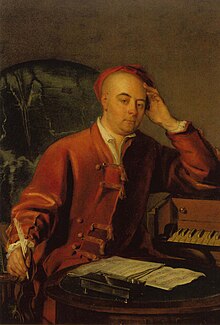Utrecht Te Deum and Jubilate
| Utrecht Te Deum and Jubilate | |
|---|---|
| by George Frideric Handel | |

|
|
| Catalogue | HWV 278, 279 |
| Year | 1713 |
| Period | Baroque |
| Genre | Sacred choral music |
| Text | |
| Language | English |
| Performed | 13 July 1713: London St Paul's Cathedral |
| Movements | 17 (10 + 7) |
| Vocal | SSAATTBB choir, solo: 2 sopranos, 2 altos, tenor, bass |
| Instrumental | |
Utrecht Te Deum and Jubilate is the common name for a sacred choral composition in two parts, written by George Frideric Handel to celebrate the Treaty of Utrecht, which established the Peace of Utrecht in 1713, ending the War of the Spanish Succession. He composed a Te Deum, HWV 278, and a Jubilate Deo (Psalm 100), HWV 279. The combination of the two texts in English follows earlier models. The official premiere of the work was on 13 July 1713 in a service in St Paul's Cathedral in London.
Handel's composition was written to celebrate the Peace of Utrecht in 1713. It was his first commission from the British royal family and established his career in London. It was also his first major sacred work to English texts. Handel followed the models of Henry Purcell's 1694 Te Deum and Jubilate with strings and trumpets, which was regularly performed for official functions in St Paul's even after the composer's death, and a 1709 setting by William Croft. As in these models, Handel composed a combination of two liturgical texts, the Ambrosian Hymn Te Deum, We praise thee, O God, and a setting of Psalm 100, O be joyful in the Lord, all ye lands, which is a regular canticle of the Anglican Morning Prayer. He followed the version of the Book of Common Prayer. Handel's work was first performed in a public dress rehearsal on 5 March 1713 in St Paul's Cathedral. The official premiere took place after the tedious peace negotiations had finished, in a solemn thanksgiving service on 7 July 1713.
The Te Deum and Jubilate, along with another composition As Pants the Hart, earned Handel a yearly income from Queen Anne's Court. Donald Burrows writes in "Handel and the English Chapel Royal" that "his close association with the Court, reinforced by his musical contribution to events that were personal to the royal family, gave him both the benefits and the disadvantages of identification with the Hanoverian establishment." However, at the time his annual pension was granted it would not have been obvious that he was going to continue to enjoy the favour of the future George I, who was in fact opposed to the Treaty of Utrecht.
...
Wikipedia
